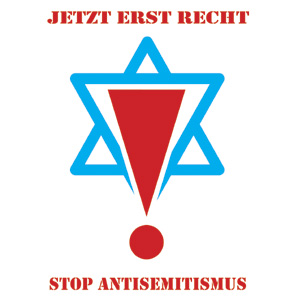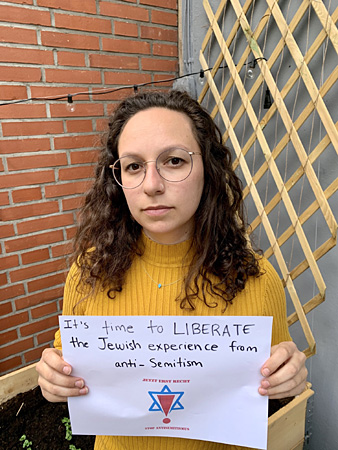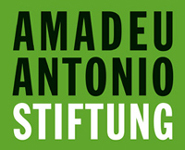AVIVA-Berlin >
Jüdisches Leben
AVIVA-BERLIN.de 7/25/5786 -
Beitrag vom 07.06.2020

AVIVA-Interview- + Fotoprojekt JETZT ERST RECHT / NOW MORE THAN EVER: Mia
Sharon Adler, Mia Szarvas
"You Jew," hate mails, right-wing hate in rap, or fascist conspiracy ideologies in the Corona crisis. At the so-called "Hygiene-Demos", participants attached a yellow "Jewish Star" to their chest, with inscriptions such as "CoV-2" or "not vaccinated". The terror attack of the synagogue in Halle on Yom Kippur. In order to make the thoughts and experiences of jewish people visible and to give them a face and a voice beyond the statistics, to show perspectives and demands of Jewish people on anti-Semitism in Germany, the Jewish photographer and journalist, editor of AVIVA-Berlin, Sharon Adler has initiated her new project JETZT ERST RECHT! / NOW MORE THAN EVER! STOP ANTISEMITISM! which is supported by the Amadeu Antonio Foundation. One of the participants is Mia Szarvas. Her slogan is: "JETZT ERST RECHT! / NOW MORE THAN EVER! - "ItôÇs time to liberate the jewish experience from antisemitism".
AVIVA: The topic of anti-Semitism in Germany today: The Annual Report 2019 by the "Bundesverband der Recherche- und Informationsstellen Antisemitismus" (Bundesverband RIAS) e.V.) published on 6 May 2020 documents 1,253 anti-Semitic incidents in four federal states. In the current context, can you please explain in more detail what you mean by your statement "itôÇs time to liberate the Jewish experience from anti-Semitism" on our demo poster and what message you want to convey with it?
Mia Szarvas: Antisemitism is, as defined by Merriam-Webster, "hostility toward or discrimination against Jews as a religious, ethnic, or racial groupôÇ. Antisemitism is not, by its definition, something Jewish. Rather, it is a form of ignorance, of prejudice, of hatred, that others perpetrate upon those who are Jewish. Jewishness exists intrinsically, it exists separate from antisemitism. In a sense, one has nothing to do with the other. Antisemitism says more about the culture that grows it than the Jews whom it is weaponized against. Being Jewish is a beautiful thing. It is a full, diverse, abundant identity overflowing with history, with folklore, tradition, spirituality, food, ritual, family connections, various languages, intertwining cultures, pluralistic expressions, and love. It is a fallacy for one to look at Jewishness and see anti-semitism. It is a fallacy that damages, burdens, and deflates the Jewish experience. Why should we have our hearts, so full of hope, excitement and joy in the celebration of our heritage and culture, be broken by a violence aimed specifically at our identities? I mean to say that people think Judaism and anti-semitism are a package that necessarily come together. That each Jewish person necessarily bears the burden of anti-semitism, as some sort of requirement or penance for having a Jewish identity. Unfortunately, it is one forced upon us often, but the Jewish experience can, and deserves to exist without this burden. Antisemitism has a cultural legacy in Europe dating back thousands of years that does not exist in the same way in the United States. Though there are isolated acts of antisemitism in the United States, antisemitism is not a part of the fabric of the culture of the USA, our culture is not built upon it, the way European culture is, the way American culture is built upon the enslavement and abuse of black bodies. Because I did not experience antisemitism as central to my Jewish experience there, I know that the Jewish experience here, in Europe, too can be free of antisemitism. Now is the time to liberate the experience of being Jewish from the cages and confines of anti-semitism. I am tired of my experience as a Jewish person in Europe being framed inside this hate, and being viewed through a lens of suffering from a prejudice that is the work of others to root out, face within themselves, and resolve, not mine.
AVIVA: Synagogues, schools and Jewish institutions in Germany are under police protection. And yet: On October 9, 2019, on Yom Kippur, the highest holiday on the Jewish calendar, a right-wing extremist, anti-Semitic 27-year-old assassin, attempted to murder the people praying in the synagogue in Halle (Saale), and on October 4 of the same year a man in Berlin tried to break into the synagogue on Oranienburger Straûe with a knife.
How (un)safe, or (un)comfortable, do you feel wearing a Magen David in public?
Mia Szarvas: I do not necessarily feel unsafe in the sense that I fear I will experience bodily harm. I do hesitate every time I put mine on because I know there is a chance someone will inflict emotional pain upon me, because that is a risk I take when I expose myself as Jewish in Germany. These thoughts never crossed my mind when I lived in America before immigrating to Germany three years ago. They literally never once crossed my mind. I was never afraid of being "found outôÇ. I did not feel exposed to some vulnerability if others knew of my Jewish identity. I was proud of it and felt I had nothing to fear. Anti-semitism was simply not on my radar in my day to day life, in fact, I thought it was something of the past. After moving to Germany and experiencing all forms of anti-semitism on a regular basis, my Jewish identity took on a kind of violence. I now recognize this is a violence inflicted upon it, which is called antisemitism. As I have previously stated, the two are actually separate from each other, but I began to feel the need to hide my Jewishness in order to protect myself from the antisemitic remarks that would likely come my way, from people who see a Jewish identity, and who conflate that identity with antisemitic cliches, and force their antisemitic beliefs upon me.
After a few too many uncomfortable, hurtful, and emotionally exhausting conversations, I started to wonder what people werenôÇt saying but rather thinking, since what they were saying was already so violent. I stopped wearing my Judaica. After two years, I decided to buy the smallest possible Hamsa to wear around my neck, hoping it was too small for people to notice, and counting on the general ignorance of Jewish culture in Germany to protect this symbol from being recognized as an expression of Jewish identity. Only this past year have I built up the courage to again publicly donn a Magen David. I must say though, every time I put it on comes with hesitation, contemplation, and a contract with myself that I may be inviting differential treatment or harassment. It feels like a statement which carries a much heavier weight than it did before. It is still an outward celebration of my Jewish identity. But now, rather than projecting joy and pride, it feels heavier around my neck, as if weighed down by defiance. I know it may be a magnet for antisemitism; it too is caged inside. If we liberate Judaism from antisemitism, the weight around my neck will grow lighter, the necklace will once again be a joyful expression of personal identity, like it was back home, when it was free.
AVIVA: In Germany, among children and young people, the word "Jew" is openly used as a swear word in schoolyards or social networks. It does not stop at verbal attacks, but repeatedly leads to a propensity to violence on the part of pupils. Why do you think that even among children and adolescents, anti-Semitic thinking and a propensity to violence already exists?
Mia Szarvas: Though I have seen how pervasive antisemitism is in Germany since moving here, this is still so hard for me to believe. And still, it breaks my heart. I do not have the answer, but I could venture a guess. Societies function by a set of rules and underlying beliefs that inform every action. This set of rules is called culture. It is a contract we as individuals sign onto in order to hold our societies of millions together. However, a child is not born with an innate knowledge of these rules. Rather, the child must be indoctrinated into the cultural beliefs of a society in order to become a member of this society. This indoctrination comes from parents, from peers, from the media, from the information around the child. Unfortunately, German culture has extremely strong, persistent, antisemitic beliefs that Germans as a society have refused to do the real, difficult work of digging up from the root. If Germans as individuals, not just as a government, continue to refuse to do the hard work of breaking down their antisemitic beliefs, their individual familyôÇs legacies of antisemitic violence, looting, and ignorance, they will continue to have those beliefs, and they will teach them to their children. German culture has a rule, and that rule is that antisemitism is part of the code of conduct of being a member of this society. These children simply want to fit in.
AVIVA: In the context of anti-Semitism, "othering" refers to the exclusion of Jewish women as "outsiders", as not belonging to it. Have you ever experienced this yourself, since you moved to Germany in 2017? For example at university, or in public places or amongst friends.
Where do you wish for more support (civil society, non-Jewish circle of friends, etc.), where would you have wished for more support in the past, where do you wish for more support, support, in the future?
Mia Szarvas: Yes, I have felt othered. I have only found community amongst other women who are also marginalized in some way (other Jews, Muslims, third or second generation immigrants, or members of the queer community). Though others have met me with kindness, there is always a point at which I become the "JewôÇ in the room. Whether consciously or not, I am made to feel other. This lack of kinship with other women is something new to me, and something devastating. The rift often comes at a point in our relationship where I feel we have grown close enough that I can be vulnerable. It is exactly at this moment when I am so ripe to be hurt by rejection, that this rejection often comes. A friendship has many parts, but one of the parts is sharing negative experiences, to find comfort and solidarity from friends. Unfortunately, many of my negative experiences in Germany come in the form of antisemitism. Often, when I express this experience to (straight white Christian) Germans, instead offering the physical or verbal embrace of friendship, they become defensive, draw away from me, and worst of all, question my experience, sewing doubt to a point of gaslighting. I wish for more support from all Germans: please - believe me when I share my experience with you, just because you have never experienced antisemitism, or you think you have never witnessed or perpetrated it, does not mean my experience is not real. Your ignorance and/or willful blindness to this insidious prejudice within your culture does not invalidate my very real suffering. Just listen, believe me, and then embrace me. Do not make it about you, please do not explain to me how you are not antisemitic, this moment is not about you. Please, just support me as your friend, who is in pain, and wants to feel valued by you.
AVIVA: The anti-Semitism commissioner of the federal government, Felix Klein, demanded harsher punishments for anti-Semitic acts and a new strategy against anti-Semitism.
How do you define antisemitism and what would be your strategies against anti-Semitism, what would be your recommendations to politics and civil society?
Mia Szarvas: Yes, there need to be harsher punishments for antisemitic acts. But antisemitism is not a hate crime. Yes, antisemitic beliefs may cause someone to physically attack a Jewish person. But this attack is not antisemitism itself. Antisemitism is an insidious belief system, that builds phantoms and pins them upon Jewish people, obscuring the individual behind them from view. It is an ignorance and a hatred that steals Jewish peopleôÇs individuality, that poisons peopleôÇs perceptions of Jewish contributions to humanity and Jewish lives. Antisemitism is a disease which blinds people and stops them from seeing Jews as human beings, complex, diverse, and individual, just like themselves. My recommendations to politics and civil society would be not to treat only the symptoms of antisemitism (Jewish death, suffering, injury), but to treat the cause. This starts in the education system. Currently, from my understanding, children in Germany are taught about the Holocaust in school starting at a young age. This education happens mainly through the lens of shame. This is, due to the HolocaustôÇs decemation of Jewish life in Germany, perhaps, a German childôÇs only exposure to anything related to Jewish identity. German children then learn to associate Jews with their deepest shame. They feel angry for carrying this shame; this resentment in turn becomes antisemitism.
Yes, German children know what the Holocaust is, they know how many Jews their Grandparents murdered. But ask them to name one Jewish holiday, you will be hard pressed for an answer. This must change. German children should learn about Jewish life in school. Learn about Jewish culture, Jewish contributions to German society, Jewish art, food, expression. German children should integrate Jewish culture into their own German identity, since the two are inextricably linked. Teach German children to see Jews as people. Only after they have formed an emotional bond with Jewish Germany, and only after the first thought that comes to their mind when they think "JewishôÇ is some positive expression of Jewish identity and not some antisemitic trope, should they learn about the Holocaust. Then, they will experience the loss. They will experience grief. And then, hopefully, they will feel a sense of accountability that will embolden them to fight for change, rather than shame, which will cause them to retreat, become defensive, and continue to perpetuate the violence of antisemitism.
About: Mia Szarvas was born in Vermont to an Israeli father and Italian-American mother, raised in California, and currently lives in Bremen, Germany. Her grandmother, Marta, escaped from Poland in August of 1939 with her parents and sister, with whom she set up a new life in Palestine, while the family they left behind perished in the Holocaust. Mia has a degree in Political Ecology from the University of California, Berkeley, and works in tech to create empowerment in unexpected places. She is curious about multiculturalism, languages, feminism, and how our intertwined histories inform the present.

Follow MiaôÇs art project "Humans Who Inspire" on Instagram @humanswhoinspire. Mia draws portraits of humans who inspire her as a meditation on the multitude of incredible humans working to make the world a better place. She also accepts requests and submissions.
Since March 2019, Mia publishes essays about her experiences being jewish in Germany and her jewishness in her column at AVIVA-Berlin.
JETZT ERST RECHT! / NOW MORE THAN EVER!
In order to make the experiences, perspectives and demands of Jewish people in Germany visible and to give them a face and a voice beyond the statistics, the Jewish photographer and journalist, editor of AVIVA-Berlin Sharon Adler has initiated her new project JETZT ERST RECHT!
JETZT ERST RECHT!
Um die Erfahrungen, Perspektiven und Forderungen von jû¥dischen Menschen in Deutschland sichtbar zu machen und ihnen abseits der Statistiken ein Gesicht und eine Stimme zu geben, hat die jû¥dische Fotografin und Journalistin, Herausgeberin von AVIVA-Berlin Sharon Adler ihr neues Projekt JETZT ERST RECHT! initiiert.

Participate
If you are also interested in participating in the interview- + photo project JETZT ERST RECHT! you can contact Sharon Adler by email at sharon@aviva-berlin.de. Please send your motivation and some biographical information about yourself as well as a statement you want to put on your demo shield.
The interview + photo project was funded by the Amadeu Antonio Foundation
Copyright: The logo was designed by the Israeli artist Shlomit Lehavi. All rights reserved. Use only after prior written request and approval by AVIVA-Berlin.
Mitmachen
Wenn Du auch Interesse hast, an dem Interview- + Fotoprojekt JETZT ERST RECHT! teilzunehmen, kannst Du Dich per eMail mit Sharon Adler unter sharon@aviva-berlin.de in Verbindung setzen. Bitte sende in dieser eMail Deine Motivation und einige biographische Informationen.
GefûÑrdert wurde das Interview- + Fotoprojekt von der Amadeu Antonio Stiftung.

Copyright: Gestaltet wurde das Signet JETZT ERST RECHT! von der israelischen Kû¥nstlerin Shlomit Lehavi. Alle Rechte vorbehalten. Nutzung ausschlieûlich nach vorheriger schriftlicher Anfrage und Genehmigung durch AVIVA-Berlin.
Copyright Photo of Mia Szarvas: Julian Kû¥llmer
Read more by Mia Szarvas at AVIVA-Berlin:
"Remembering is more than the opposite of forgetting: a reflection on my personal relationship with the Holocaust by looking at the lost Jewish Life in Lvov"
"Hannukah Is"
"Mias column. The Magic of being Jewish"
"A German Christmas: Jewish Stars and almost no Jews"
"A Resolution for the New Year." Reflections on Being Jewish by Mia Szarvas
"Uncovering Jewish Venice." Reflections on Being Jewish by Mia Szarvas
"LetôÇs Get Uncomfortable ãÎ." Reflections on Being Jewish in Germany by Mia Szarvas
"I Answered All Your Question About Jews, so You DonôÇt Have To (And so I DonôÇt Have To)" - reflections by Mia Szarvas
"I DonôÇt Want Your Shame" - reflections by Mia Szarvas
Yom HaShoah - reflections by Mia Szarvas